
Guests
- Jonathan Pollakanti-Zionist activist and co-founder of Anarchists Against the Wall.
- Nizar Milbesa close friend of Sayfollah Musallet’s family.
We go to the occupied West Bank for an update on how the family of a 20-year-old Palestinian American from Florida, Sayfollah “Saif” Musallet, is demanding justice after he was beaten to death by Israeli settlers in the occupied West Bank. Musallet and another Palestinian, 23-year-old Mohammad al-Shalabi, were attacked by a group of Israeli settlers on Friday in the town of Sinjil, northeast of Ramallah, where their families own farmland. Eyewitnesses say the settlers brutally beat Musallet and fatally shot al-Shalabi, then prevented ambulances from reaching their victims for hours. Musallet was pronounced dead before he could reach a hospital.
“The settlers and the military don’t only work hand in hand,” says anti-Zionist activist Jonathan Pollak, who was injured in the same protest. “They are part and parcel of implementing the same policy … of ethnic cleansing in the West Bank.”
“Palestinians here have zero rights,” adds Nizar Milbes, a distant relative and close friend of the Musallet family, who says settlers have been encroaching on Palestinian lands even more aggressively since October 7, 2023.
Transcript
AMY GOODMAN: We begin today’s show looking at the rise of Israeli settler violence against Palestinians across the occupied West Bank. The family of 20-year-old American Sayfollah Musallet is demanding justice and for the U.S. government to lead an investigation into his killing by Israeli settlers. Musallet, known as Saif to his family and friends, was in the West Bank from Florida to visit his relatives in the village of al-Mazra’a ash-Sharqiya, northeast of Ramallah. He was born and grew up in Port Charlotte, Florida, and worked at his father’s ice cream and dessert shop, which they’d recently opened in Tampa.
On Friday, Musallet and another Palestinian, 23-year-old Mohammad al-Shalabi, were attacked by a group of Israeli settlers while they were in the neighboring town of Sinjil, where their families own farmland and an area Israeli settlers have recently repeatedly targeted with violent attacks, with Palestinians describing being terrorized as Israelis have seized agricultural land on a Palestinian farm. In response, residents of nearby villages have organized to protect the land. On Friday, when Saif joined them, Israeli settlers brutally beat him and fatally shot al-Shalabi. Eyewitnesses said at least two of the settlers were armed with M-16 assault rifles and wore army pants, and described how the settlers surrounded Saif and others, also attacking them with batons.
Following news of the attack, Saif’s cousin Diana read a statement from the family.
DIANA MUSALLET: We are devastated that our beloved Sayfollah Musallet, nicknamed Saif, was brutally beaten to death in our family’s land by illegal Israeli settlers who were attempting to steal it. Israeli settlers surrounded Saif for over three hours as paramedics attempted to reach him, but the mob of settlers blocked the ambulance and paramedics from providing lifesaving aid. After the mob of Israeli settlers cleared hours later, Saif’s younger brother rushed to carry him to the ambulance. Saif was killed and died before reaching the hospital.
AMY GOODMAN: On Sunday, hundreds of Palestinians gathered for a funeral procession in the West Bank for Saif Musallet and Mohammad al-Shalabli. Saif’s father, Kamel, traveled from Florida to attend his son’s funeral.
Saif’s family says they haven’t heard from U.S. officials. In a statement to Al Jazeera Friday, the State Department said it, quote, “has no higher priority than the safety and security of US citizens overseas. … We are aware of reports of the death of a U.S. citizen in the West Bank. When a US citizen dies overseas, we stand ready to provide consular services,” the U.S. State Department said.
Haaretz reported there are currently no Israelis detained in connection with Saif’s killing.
He’s at least the seventh U.S. citizen to be killed by Israeli soldiers or settlers since 2022, with advocates condemning the U.S.’s inaction in fighting for accountability, including in the killings of Palestinian American journalist Shireen Abu Akleh, May 11th, 2022, fatally shot by Israeli soldiers while she reported on an Israeli raid outside the Jenin refugee camp, and Turkish American activist Ayşenur Ezgi Eygi, who was shot dead by Israeli forces while taking part in a weekly protest against illegal Israeli settlements in the town of Beita in 2024. Meanwhile, Al Jazeera reports Israeli violence has killed some 1,000 Palestinians in the occupied West Bank since October 23.
For more, we’re joined by two guests. In Yaffa, Jonathan Pollak is a longtime anti-Zionist activist and co-founder of Anarchists Against the Wall. He was injured Friday by Israeli settlers in the West Bank town of Sinjil when protesting just before Saif was killed. And in the occupied West Bank, we’re joined by Nizar Milbes, a distant relative, a close friend of Sayfollah Musallet’s family. Nizar Milbes is in the village of al-Mazra’a ash-Sharqiya, northeast of Ramallah.
We thank you both for being with us. Jonathan, as I look at you, you have a black eye. Can you describe what happened that day, leading up to the Israeli settlers beating Saif to death?
JONATHAN POLLAK: I can tell what I’ve witnessed, which is somewhat limited because I was attacked and detained very, very soon after everything began. Myself and another Palestinian, a young Palestinian man, were helping an older injured Palestinian man, evacuating him away from where settlers were attacking people. At some point, the settlers descended on us from above with batons and just beat us up, the young Palestinian man that was with me more than myself, and myself, as well, as is very evident from the bruises on my face.
It’s important to note that there were Israeli soldiers there. They literally pried us from the settlers’ hands while they attacked us, while we were on the floor and they were on top of us. Despite that, they’ve chosen to detain and arrest us and do nothing with the assailants, despite having seen everything and despite having been there. We were detained there for a long time before taking — being taken to the police station. And what we saw at some point is that all the settlers who were present, which were at least two dozen, entered their cars all at once and drove, in sight, like, while the soldiers see them, drove into the village. No one had — none of the soldiers have thought of stopping them or arresting them or doing anything else to prevent the lynch that took place afterwards, in which Sayfollah and Mohammad were killed.
Later on that day, when we were — when we were already down the road, still detained, we at some point saw a convoy of at least a dozen settler cars filled with people passing — after the lynch, passing by Israeli law enforcement, both, like, military border police, which is a paramilitary force of the Israeli police, and regular Israeli civilian police. None of them had dreamed of stopping these settlers, who had just been involved in killing someone, at least some of them, and even asking for their IDs.
People often talk about settlers, about Israeli settlers, and extremist violence. And it’s important to me to convey the message that this is a red herring. This isn’t an issue of some extremists, of outlaws acting outside the confines of Israeli society. The settlers and the military don’t only work hand in hand, like it was evident from how our assault was treated and how the whole incident was treated. They are part and parcel of implementing the same policy of the Israeli government, of the Israeli regime, the policy of ethnic cleansing in the West Bank, the policy of using — of employing as much violence as possible in order to remove Palestinians from their land. It was evident in the murder of Sayfollah and of Mohammad on Tuesday. It is evident in the ethnic cleansing of dozens and dozens of Palestinian communities from the West Bank since October 7th, 2023. And it is an extension of the genocide that Israel is perpetrating in the Gaza Strip. And the common denominator of all of these is that it is one policy employed by the Israeli regime, representative of Israeli public opinion, and that Israel is allowed to employ as much force as it wants, as much violence as it wants, in order to carry out these policies, in order to exterminate in the Gaza Strip and remove, physically remove, Palestinians in the West Bank from their lands.
JUAN GONZÁLEZ: And, Jonathan, when you were held by the Israeli police, what happened? How long were you held? And how were you treated by them?
JONATHAN POLLAK: This isn’t the — I’m sorry to say, but this isn’t the question. The question isn’t about me personally or how a specific policeman or specific policemen, in plural, treated me. What I’m interested in talking about is the systemic nature of what is happening.
So, what is interesting in this case is that I was arrested with another Palestinian. While I was released very quickly, the Palestinian man was only released from court today — released by court from jail today. And this is another example of Israeli apartheid, where I myself was processed and tried under the Israeli penal code, while my Palestinian comrade, the one who was arrested with me and under the exact same circumstances, suspected of the exact same things, assaulted like — exactly like I was by the exact same settlers, the same settlers who later went on to kill Sayfollah and Mohammad — we were processed through two different legal systems, the Israeli penal code for myself and Israeli military law for my Palestinian comrade.
So, when we talk about how I was treated, the important question to ask is why I was treated differently from my Palestinian comrade. And what does that mean about the Israeli regime and the ability and need for it to be confronted not only from within, not only from Palestine, but also be forced into accountability from the outside? What support do Palestinians deserve? And how do we bring about a reality in which they are able to gain their liberation?
JUAN GONZÁLEZ: I’d like to bring in, if possible, Nizar Milbes, as well. Nizar, can you talk about when you learned of the attack on friends and relatives of yours?
NIZAR MILBES: Well, let me give a little bit of context. We have been — this area has been an area where it’s called al-Batin. It’s on the outskirts of the town. And many of the landowners are American, American citizens. And we’ve been trying to reach — as you’re aware, you know, the settlers are taking over not only Area C, which, to give, you know, your viewers some context, Area C was an area that was allocated during the Oslo Accords, which was supposed to part of a Palestinian state, but eventually the Israeli government allocated it, which a lot of the land is strategic land. It has some of high altitudes, very important security installations and, you know, a lot of fertile land, farmland. And so, in the past — you know, I remember when I was living here in the '90s, when my parents brought us here to, you know, learn our culture and root us in the land. You know, they would build communities in these areas that were quite a distance from our towns. But after the Oslo Accords, the Areas A and B, which are supposed to be under, you know, that agreement, are supposed to be civilly and security-wise administrated by the Palestinian Authority. So, even under Israeli law, they're not even supposed to encroach anywhere near this area.
We’ve been hearing over the past — since October 7th that they’ve been taking lands and encroaching and destroying property as they move towards Area A and B. What really caught our eye is that we never — which we never expected, given that our town and the surrounding towns have a large majority of American citizen — residents that have American citizenship. Our town, in particular, the inhabitants comprise of about 60% American citizens. And the land in this particular area where this attack has happened, that happened on Friday, is on the outskirts of the town. It’s an area that has beautiful scenery, very fertile. Many of the landowners — you know, it’s one of the last havens that Palestinians have left to enjoy their time, given that the fact that, you know, Palestinians are not allowed to go — you know, to enter so-called Israel proper. They can’t go to the beach. They can’t go to the springs. They can’t visit the desert. So they’re secluded in this area of the West Bank where they’re not allowed to go to the Area C, which is some of the most, you know, beautiful parts of the West Bank. And so, this area, al-Batin, it’s one of the last havens that Palestinians have to go to, you know, get away from their daily life and the daily lives of living under occupation, checkpoints, daily raids.
And so, what really got the — galvanized the community is that this particular area, which we never thought that they would attempt to, you know, come to, they started coming over there and burning vacation homes, tents that the townspeople put up to go, you know, every Friday to go enjoy their time, barbecue. And so, this has been going on for several weeks. And so, recently, you know, during the summer, a lot of American citizens come to visit their property. So, some of the townspeople had asked us to — you know, because the people here, as — you know, echoing the other guest, the Palestinians here have zero rights.
AMY GOODMAN: Nizar —
NIZAR MILBES: You know, they have no [inaudible]. They —
AMY GOODMAN: Nizar, we just have a minute, and I wanted to get to the issue of, in fact, Saif didn’t die as he — when he was being beaten by the Israeli settlers, but the fact that they wouldn’t let the ambulance come. Can you talk about that for a minute? I was just watching CNN. The CNN journalist, they smashed the window of his vehicle as they went in the area. Can you talk about what happened to Saif at the very end? We just have a minute.
NIZAR MILBES: Right. So, what happened is, is — you know, I was getting towards the end of what had occurred that led up to that. So, we’ve been going the past every once or twice a week to reach the land. And every week, it’s been different. The prior week, we had went with journalists. We had the townspeople calling American citizens to go to their lands and just peacefully go — just peacefully go on the lands without — no one is armed.
This particular time, some of the youth had ventured off into some of the areas, you know, because you have — you know, this is about around, you know, I believe, 1,000 dunams of land. So, some of the youth, including Saif and Mohammad, you know, as we were driving on the road, they kind of deviated and went, you know, to go to their part of the land. And a lot —
AMY GOODMAN: Very quickly, about the ambulance?
NIZAR MILBES: The ambulance — actually, when we were going up, ambulances were coming down. And, you know, they were being attacked. Their windshield was smashed. You know, they were giving no deference to, you know, ambulances, to the press. And Saif, unfortunately, you know, when he had tried to attempt his part of the land, we had — they got ambushed. A lot of times, the settlers, they know the area pretty well. And it seems like they stage their — you know, they strategize their attacks. And, you know, he seemed to be alone, with maybe another youth, and they got to him. I mean, he didn’t attack them. He wasn’t armed. And they just beat him. The autopsy shows head trauma to the back of the head and a couple of kicks to the body.
AMY GOODMAN: Nizar, I want to thank you for being with us, and our condolences. Nizar Milbes, a Palestinian American distant relative, close friend of Sayfollah Musallet’s family. Saif’s dad has just come in from Florida. The funeral was held on Sunday. And Jonathan Pollak, anti-Zionist activist, co-founder of Anarchists Against the Wall, injured on Friday, the day that Saif was killed by Israeli settlers in the West Bank town of Sinjil, when protesting.
When we come back, who’s being held at that Everglades immigrant jail? Who’s in charge of what the Republican politicians are calling “Alligator Alcatraz”? Hundreds have been held there with no criminal charges against them. That’s according to a new Miami Herald investigation. We’ll speak to the reporter, as well as Florida Congressmember Maxwell Frost, who just toured the Everglades jail. Stay with us.
[break]
AMY GOODMAN: “The Demagogue” by Lila Downs in our Democracy Now! studio.

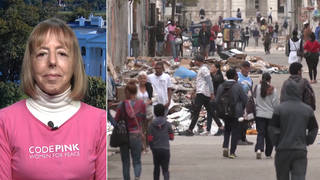
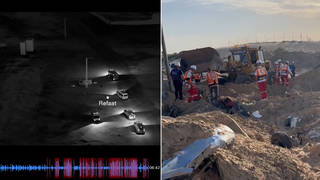
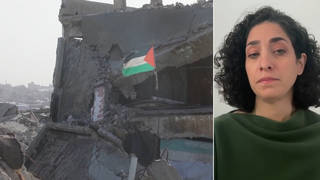
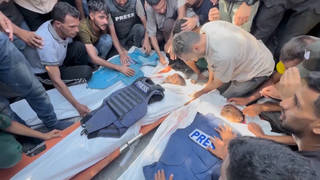





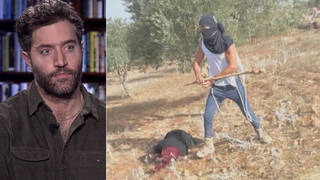
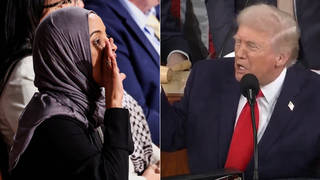
Media Options